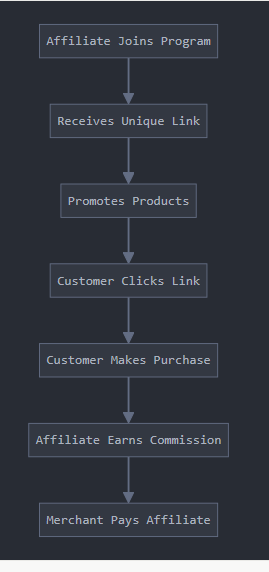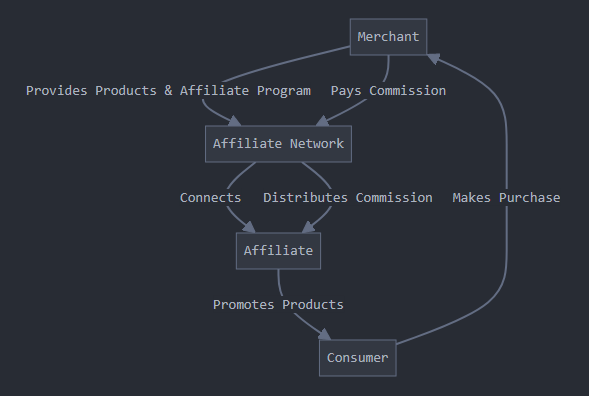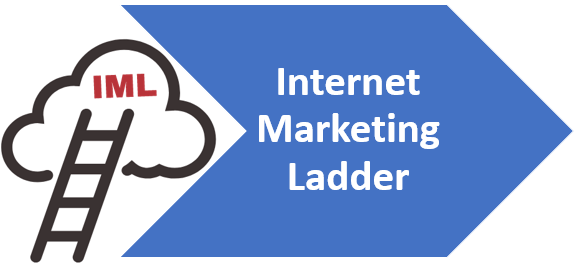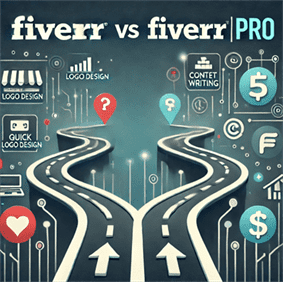What is Affiliate Marketing: A Comprehensive Guide for Beginners
What is affiliate marketing? Find out in this in-depth guide. Learn strategies, tools, and tips to become a successful affiliate marketer.
Introduction – What is Affiliate Marketing
Are you looking for a way to earn money online without creating your own products or services? Have you heard about affiliate marketing but aren’t quite sure what it entails? You’re in the right place! In this comprehensive guide, we’ll dive deep into the world of affiliate marketing, exploring everything from its basic concept to advanced strategies for success.
Affiliate marketing has revolutionized the way people make money online, offering a flexible and potentially lucrative opportunity for individuals from all walks of life. Whether you’re a stay-at-home parent, a college student, or someone looking to supplement their income, affiliate marketing could be the perfect solution for you.
In this article, we’ll answer the burning question, “What is affiliate marketing?” and provide you with all the information you need to get started on your journey to becoming a successful affiliate marketer. So, buckle up and get ready to explore this exciting world of online entrepreneurship!
What is Affiliate Marketing?
Affiliate marketing is a performance-based marketing strategy where businesses reward affiliates (also known as publishers) for promoting their products or services. In simpler terms, it’s a way for you to earn a commission by recommending products or services to others.
Here’s a more detailed breakdown of what affiliate marketing entails:
- Promotion: As an affiliate marketer, your primary role is to promote products or services created by other companies.
- Commission-based: You earn a commission when someone makes a purchase through your unique affiliate link or completes a specified action (like signing up for a free trial).
- No inventory: Unlike traditional retail businesses, you don’t need to create, store, or ship any products.
- Flexible: You can promote products across various channels, including websites, blogs, social media, email marketing, and more.
- Performance-driven: Your earnings are directly tied to your performance in driving sales or leads for the merchant.
Affiliate marketing has gained immense popularity due to its low barrier to entry and the potential for passive income. It’s a win-win situation for both merchants and affiliates: merchants get increased exposure and sales, while affiliates earn money by leveraging their marketing skills and audience.
How Does Affiliate Marketing Work?
Now that we’ve answered the question “What is affiliate marketing?”, let’s delve into how it actually works. The process can be broken down into several key steps:
- Joining an Affiliate Program: You start by signing up for an affiliate program offered by a merchant or through an affiliate network.
- Getting a Unique Affiliate Link: Once approved, you receive a unique affiliate link or code that identifies you as the referrer.
- Promoting Products: You then promote the merchant’s products or services using your affiliate link across various marketing channels.
- Customer Clicks and Purchases: When a potential customer clicks on your affiliate link and makes a purchase, it’s tracked by the merchant’s system.
- Earning Commissions: If the customer completes the desired action (usually a purchase), you earn a commission based on the agreed-upon rate.
- Receiving Payments: Merchants typically pay out commissions on a regular basis (e.g., monthly) once you reach a certain threshold.
Here’s a visual representation of the affiliate marketing process:

graph TD
A[Affiliate Joins Program] --> B[Receives Unique Link]
B --> C[Promotes Products]
C --> D[Customer Clicks Link]
D --> E[Customer Makes Purchase]
E --> F[Affiliate Earns Commission]
F --> G[Merchant Pays Affiliate]
It’s important to note that the specific details of how affiliate marketing works can vary depending on the program and the merchant. Some programs may offer different commission structures, such as:
- Pay Per Sale (PPS): You earn a percentage of the sale amount.
- Pay Per Lead (PPL): You earn a fixed amount for each qualified lead you generate.
- Pay Per Click (PPC): You earn based on the number of clicks your affiliate link receives.
Understanding these different models will help you choose the right affiliate programs for your marketing strategy.
Key Players in Affiliate Marketing
To fully grasp the concept of affiliate marketing, it’s crucial to understand the key players involved in the process. There are typically four main parties:
- Merchant (Also known as Advertiser or Retailer)
- The creator or owner of the product or service being promoted
- Responsible for providing affiliate programs and tracking sales
- Examples include Amazon, Shopify, and Bluehost
- Affiliate (Also known as Publisher or Partner)
- The promoter of the merchant’s products or services
- Earns commissions for driving sales or leads
- Can be individuals, companies, or websites
- Consumer
- The end-user who purchases the product or service
- Completes the action that results in the affiliate earning a commission
- Affiliate Network (Optional)
- Acts as an intermediary between merchants and affiliates
- Provides a platform for managing affiliate programs
- Examples include Commission Junction, ShareASale, and Rakuten Marketing
Here’s a diagram illustrating the relationship between these key players:

The diagram illustrates:
- How the Merchant provides products and an affiliate program to the Affiliate Network
- The Affiliate Network’s role in connecting Affiliates with Merchants
- The Affiliate’s function in promoting products to Consumers
- The Consumer’s purchase from the Merchant
- The flow of commission payments from the Merchant through the Affiliate Network to the Affiliate
graph TD
A[Merchant] -->|Provides Products & Affiliate Program| B[Affiliate Network]
B -->|Connects| C[Affiliate]
C -->|Promotes Products| D[Consumer]
D -->|Makes Purchase| A
A -->|Pays Commission| B
B -->|Distributes Commission| C
Understanding the roles and relationships between these players is essential for navigating the affiliate marketing landscape effectively.

Types of Affiliate Marketing
Affiliate marketing can be categorized into different types based on the level of involvement and the relationship between the affiliate and the product. Here are the three main types:
- Unattached Affiliate Marketing
- No connection between the affiliate and the product or service
- Purely based on pay-per-click advertising
- Least involved form of affiliate marketing
- Related Affiliate Marketing
- Affiliate has some relation to the niche of the product
- May have expertise or influence in the industry
- More credible and effective than unattached marketing
- Involved Affiliate Marketing
- Deepest level of connection with the product or service
- Affiliate has personally used and can vouch for the product
- Most authentic and effective form of affiliate marketing
Each type has its own advantages and challenges. As a beginner, you might start with related or involved affiliate marketing to build trust with your audience and increase your chances of success.
Benefits of Affiliate Marketing
Affiliate marketing offers numerous advantages for both affiliates and merchants. Let’s explore some of the key benefits:
For Affiliates
- Low Startup Costs: You can start with minimal investment, often just a website or social media presence.
- No Product Creation: You don’t need to create your own products or handle inventory.
- Flexible Work Environment: Work from anywhere with an internet connection.
- Passive Income Potential: Once set up, you can earn money even while you sleep.
- Multiple Income Streams: Promote various products across different niches.
- Scalability: Easily scale your affiliate marketing business as you grow.
For Merchants
- Cost-Effective Marketing: Pay only for results (sales or leads).
- Expanded Reach: Access to a wider audience through affiliates’ networks.
- Brand Awareness: Increased exposure through various marketing channels.
- Low Risk: Minimal upfront costs compared to traditional advertising.
- Performance Tracking: Easy to measure the success of marketing campaigns.
- Diverse Marketing Strategies: Benefit from affiliates’ unique promotional methods.
By understanding these benefits, you can better appreciate the potential of affiliate marketing and how it can fit into your online business strategy.
Getting Started with Affiliate Marketing
Now that you understand what affiliate marketing is and its benefits, let’s dive into how you can get started:
- Choose Your Niche
- Select a topic you’re passionate about or knowledgeable in
- Research market demand and competition
- Consider profitability and longevity of the niche
- Create a Platform
- Build a website or blog (e.g., using WordPress)
- Establish a strong social media presence
- Consider starting a YouTube channel or podcast
- Build Your Audience
- Create valuable content that addresses your audience’s needs
- Engage with your followers and build trust
- Use SEO strategies to increase organic traffic
- Join Affiliate Programs
- Research and apply to relevant affiliate programs
- Consider joining affiliate networks for more options
- Read and understand the terms and conditions of each program
- Promote Products
- Create honest and helpful product reviews
- Use various promotional methods (e.g., blog posts, videos, emails)
- Disclose your affiliate relationships transparently
- Track and Analyze Performance
- Use analytics tools to monitor your traffic and conversions
- Experiment with different strategies and optimize your approach
- Continuously learn and adapt to improve your results
Remember, success in affiliate marketing doesn’t happen overnight. It requires patience, persistence, and a willingness to learn and adapt.
Choosing the Right Affiliate Programs
Selecting the right affiliate programs is crucial for your success. Here are some factors to consider when choosing affiliate programs:
- Relevance to Your Niche: Choose products that align with your audience’s interests and needs.
- Commission Rates: Look for programs offering competitive commission rates.
- Cookie Duration: Longer cookie durations increase your chances of earning commissions.
- Product Quality: Promote high-quality products to maintain your audience’s trust.
- Payment Terms: Understand the payment schedule and minimum payout thresholds.
- Support and Resources: Look for programs that provide marketing materials and support.
- Reputation: Research the merchant’s reputation and reliability.
- Conversion Rates: Consider the program’s average conversion rates if available.
Popular affiliate programs and networks to explore include:
- Amazon Associates
- ShareASale
- Commission Junction (CJ Affiliate)
- ClickBank
- Rakuten Marketing
- Awin
Remember to diversify your affiliate partnerships to reduce risk and maximize earning potential.

Effective Affiliate Marketing Strategies
To succeed in affiliate marketing, you need to implement effective strategies. Here are some proven techniques:
- Content Marketing
- Create high-quality, informative blog posts, articles, and guides
- Use SEO best practices to improve organic search rankings
- Develop a content calendar to maintain consistency
- Email Marketing
- Build an email list of engaged subscribers
- Provide value through newsletters and targeted campaigns
- Promote affiliate products relevantly and non-intrusively
- Social Media Marketing
- Choose platforms where your target audience is most active
- Share valuable content and engage with your followers
- Use social media advertising to expand your reach
- Video Marketing
- Create product reviews and tutorials on YouTube
- Use live streaming to engage with your audience in real-time
- Incorporate affiliate links in video descriptions
- Influencer Partnerships
- Collaborate with influencers in your niche
- Cross-promote products and services
- Leverage each other’s audiences for mutual benefit
- Comparison Sites and Reviews
- Create comprehensive product comparisons
- Write honest, detailed reviews of affiliate products
- Use tables and charts to present information clearly
- Seasonal and Holiday Promotions
- Capitalize on seasonal trends and holiday shopping
- Create gift guides and special offer roundups
- Plan your promotions well in advance
- Webinars and Online Courses
- Host educational webinars featuring affiliate products
- Create online courses with relevant product recommendations
- Offer exclusive discounts to attendees and students
Remember to always prioritize providing value to your audience over aggressive selling. Building trust and credibility is key to long-term success in affiliate marketing.
Common Challenges and How to Overcome Them
While affiliate marketing can be rewarding, it’s not without its challenges. Here are some common obstacles you might face and strategies to overcome them:
- Intense Competition
- Challenge: Standing out in a crowded market.
- Solution: Focus on a specific niche, provide unique value, and build a strong personal brand.
- Building Trust with Your Audience
- Challenge: Convincing your audience to trust your recommendations.
- Solution: Be transparent about affiliate relationships, only promote products you believe in, and provide honest reviews.
- Keeping Up with Industry Changes
- Challenge: Adapting to frequent changes in algorithms, regulations, and trends.
- Solution: Stay informed through industry blogs, attend conferences, and join affiliate marketing communities.
- Managing Multiple Affiliate Programs
- Challenge: Tracking links, commissions, and payments across various programs.
- Solution: Use affiliate management tools and spreadsheets to stay organized.
- Dealing with Commission Structure Changes
- Challenge: Adapting to sudden changes in commission rates or structures.
- Solution: Diversify your affiliate partnerships and income streams to reduce risk.
- Overcoming Ad Blockers
- Challenge: Ad blockers preventing affiliate links from tracking properly.
- Solution: Use link cloaking techniques and focus on creating valuable content that doesn’t rely solely on banner ads.
- Maintaining Consistent Traffic
- Challenge: Keeping a steady flow of visitors to your affiliate offers.
- Solution: Implement a robust SEO strategy, use email marketing, and diversify your traffic sources.
- Avoiding Affiliate Link Theft
- Challenge: Protecting your commissions from link hijacking.
- Solution: Use link cloaking, monitor your traffic sources, and educate your audience about the importance of using your links.
By anticipating these challenges and implementing proactive solutions, you’ll be better equipped to navigate the affiliate marketing landscape successfully.

Tools and Resources for Affiliate Marketers
To streamline your affiliate marketing efforts and improve your productivity, consider using these tools and resources:
- Affiliate Program Platforms
- ShareASale
- Commission Junction
- ClickBank
- Amazon Associates
- Link Management
- Pretty Links
- ThirstyAffiliates
- Geniuslink
- Analytics and Tracking
- Google Analytics
- ClickMeter
- Voluum
- Keyword Research
- SEMrush
- Ahrefs
- Google Keyword Planner
- Content Creation
- Canva (for graphics)
- Grammarly (for proofreading)
- Hemingway Editor (for readability)
- Email Marketing
- MailChimp
- ConvertKit
- AWeber
- Social Media Management
- Hootsuite
- Buffer
- Sprout Social
- Productivity and Organization
- Trello
- Asana
- Evernote
- Learning Resources
- Affiliate Marketing Courses on Udemy or Coursera
- Industry blogs (e.g., Affiliate Marketing Blog, AffiliateTip.com)
- Podcasts (e.g., Affiliate Buzz, The Affiliate Guy)
- YouTube channels dedicated to affiliate marketing
- Competitive Research
- SimilarWeb
- SpyFu
- MozBar
Remember, while tools can greatly enhance your efficiency and effectiveness, they’re not a substitute for hard work and quality content. Focus on providing value to your audience first, and use these tools to support and amplify your efforts.

Legal and Ethical Considerations
As an affiliate marketer, it’s crucial to understand and adhere to legal and ethical guidelines. This not only protects you from potential legal issues but also helps build trust with your audience. Here are some key considerations:
- FTC Disclosure Requirements
- Clearly disclose your affiliate relationships
- Use language that’s easy for your audience to understand
- Place disclosures where they’re easily noticeable
Example disclosure: “This post contains affiliate links. If you use these links to buy something, we may earn a commission at no additional cost to you.”
- GDPR Compliance
- If you’re targeting EU residents, ensure your website is GDPR compliant
- Obtain explicit consent for collecting personal data
- Provide clear information about how you use collected data
- Intellectual Property Rights
- Respect copyright laws when using images, text, or other content
- Obtain proper permissions or licenses for any content you don’t own
- Honesty in Advertising
- Don’t make false or exaggerated claims about products
- Provide honest reviews based on personal experience or thorough research
- Privacy Policy
- Have a clear privacy policy on your website
- Explain how you collect, use, and protect user data
- Terms and Conditions
- Clearly state the terms of use for your website
- Include information about your affiliate relationships
- Ethical Promotion
- Only promote products you believe in and would use yourself
- Consider the potential impact of products on your audience
By following these legal and ethical guidelines, you’ll build a more sustainable and reputable affiliate marketing business.
Future Trends in Affiliate Marketing
To stay ahead in the affiliate marketing game, it’s important to keep an eye on emerging trends. Here are some future trends that could shape the industry:
- Influencer Partnerships
- Increased collaboration between brands and micro-influencers
- More authentic, niche-specific promotions
- Voice Search Optimization
- Growing importance of optimizing content for voice search queries
- Focus on natural language and conversational keywords
- Video Content Dominance
- Continued rise of video marketing, especially short-form content
- Integration of affiliate links in video descriptions and overlays
- Artificial Intelligence and Machine Learning
- Use of AI for personalized product recommendations
- Machine learning algorithms to optimize affiliate campaigns
- Mobile-First Approach
- Increasing focus on mobile-optimized content and user experience
- Growth of mobile affiliate networks and apps
- Blockchain Technology
- Potential use of blockchain for transparent and secure affiliate tracking
- Cryptocurrency payments for affiliate commissions
- Increased Regulation
- Stricter guidelines and regulations around disclosure and data privacy
- Greater emphasis on ethical marketing practices
- Diversification of Affiliate Channels
- Expansion beyond traditional blogs and websites
- Growth in podcast, newsletter, and app-based affiliate marketing
By staying informed about these trends and adapting your strategies accordingly, you’ll be well-positioned to succeed in the evolving world of affiliate marketing.
Key Takeaways
As we wrap up this comprehensive guide on “What is Affiliate Marketing,” let’s summarize the core tips and insights:
- Affiliate marketing is a performance-based strategy where you earn commissions for promoting other companies’ products or services.
- The key players in affiliate marketing are merchants, affiliates, consumers, and sometimes affiliate networks.
- Success in affiliate marketing requires choosing the right niche, building a strong platform, and consistently providing value to your audience.
- Effective strategies include content marketing, email marketing, social media promotion, and honest product reviews.
- Overcome common challenges by staying informed, diversifying your income streams, and focusing on building trust with your audience.
- Utilize various tools and resources to streamline your affiliate marketing efforts and improve productivity.
- Always adhere to legal and ethical guidelines, including proper disclosure of affiliate relationships.
- Stay updated on future trends like influencer partnerships, AI integration, and mobile optimization to remain competitive.
Remember, affiliate marketing is not a get-rich-quick scheme. It requires dedication, patience, and a genuine desire to help your audience. By focusing on providing value and building trust, you’ll be well on your way to success in the world of affiliate marketing.

Frequently Asked Questions
To further clarify some common queries about affiliate marketing, here’s a list of frequently asked questions:
- Q: Do I need a website to start affiliate marketing? A: While having a website is beneficial, it’s not absolutely necessary. You can start with social media platforms, YouTube channels, or even email marketing.
- Q: How much money can I make with affiliate marketing? A: Earnings vary widely depending on factors like niche, audience size, and effort. Some affiliates make a few hundred dollars a month, while top earners can make six or seven figures annually.
- Q: Is affiliate marketing saturated? A: While some niches are competitive, there’s always room for unique, value-driven content. Focus on finding your unique angle and serving your audience well.
- Q: How long does it take to make money with affiliate marketing? A: It varies, but most successful affiliates start seeing consistent income after 6-12 months of dedicated effort. Patience and persistence are key.
- Q: Can I do affiliate marketing without an audience? A: It’s challenging but possible. You can start by leveraging paid advertising or collaborating with established influencers while building your own audience.
- Q: What’s the difference between affiliate marketing and MLM? A: Affiliate marketing involves promoting products for a commission, while Multi-Level Marketing (MLM) typically requires recruiting others into a network and often involves selling products yourself.
- Q: How do I choose the right products to promote? A: Choose products that align with your niche, offer good commission rates, and provide value to your audience. Personal experience with the product is a plus.
- Q: Is it possible to do affiliate marketing full-time? A: Yes, many people make a full-time income from affiliate marketing. However, it typically requires significant time, effort, and strategic planning to reach this level.
- Q: How often should I promote affiliate products? A: There’s no one-size-fits-all answer, but a good rule of thumb is to balance promotional content with valuable, non-promotional content. A ratio of 80% value-driven content to 20% promotional content is often recommended.
- Q: Do I need to disclose that I’m using affiliate links? A: Yes, it’s legally required in many countries (including the US) and ethically important to disclose your affiliate relationships clearly to your audience.
By addressing these common questions, we hope to provide a clearer understanding of what affiliate marketing entails and how you can get started on your journey to becoming a successful affiliate marketer.
In conclusion, affiliate marketing offers a unique opportunity to earn income online by promoting products and services you believe in. While it requires effort and patience, the potential rewards – both financial and personal – can be significant. As you embark on your affiliate marketing journey, remember to always prioritize providing value to your audience, stay informed about industry trends, and maintain ethical practices. With dedication and the right strategies, you can build a successful and sustainable affiliate marketing business.
Related Posts:
- How to Make Money with Clickbank Affiliate Marketing
- How to Start Affiliate Marketing with no Money
- Affiliate Marketing for beginners.
More Reading
- https://affiliate-program.amazon.com/
- https://www.statista.com/statistics/693438/affiliate-marketing-spending/
- https://www.clickbank.com/
- https://www.investopedia.com/personal-finance/affiliate-marketing-can-you-really-make-money/
- https://www.hubspot.com/partners/affiliates
- https://www.shareasale.com/
- https://inkwelleditorial.com/affiliate-marketing-advice-for-newbies-get-first-sale
- https://www.payscale.com/research/US/Job=Affiliate_Marketer/Salary








